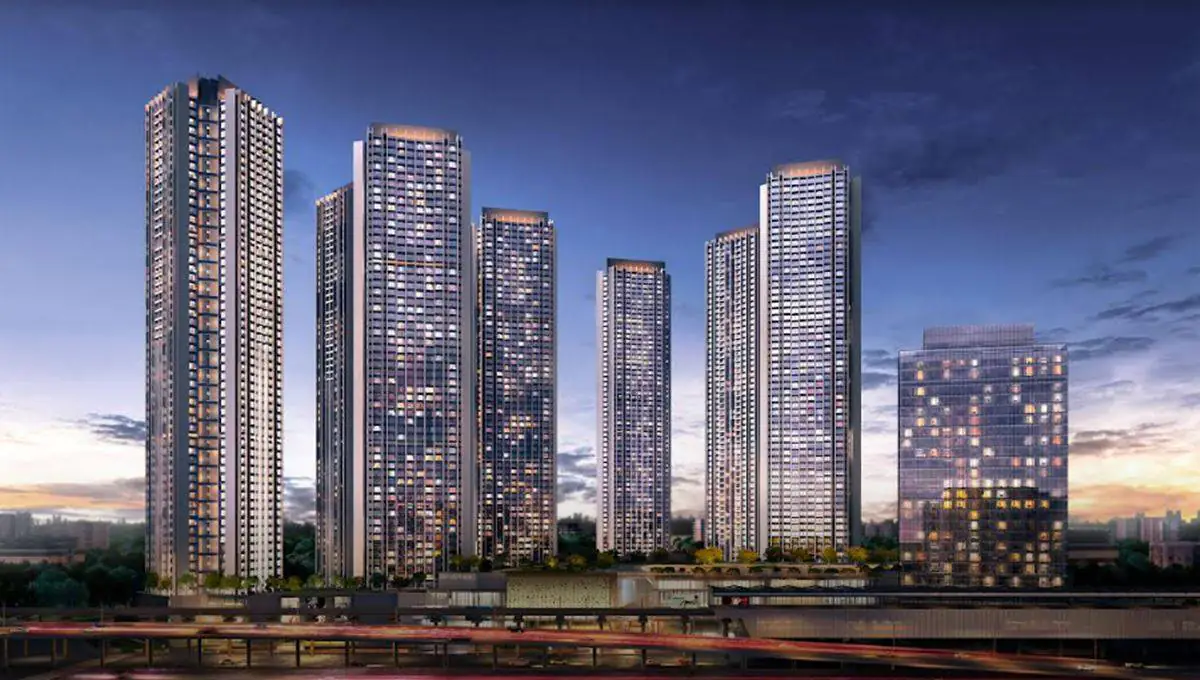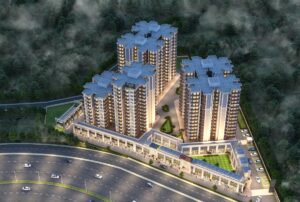June 20, 2024 |
Budget 2024 Sets the Stage for a Sustainable Growth Trajectory for Real Estate

While the Budget sidestepped the long-standing demands of the real estate sector, the focus on job creation, skilling and employment-linked incentives, boost to infrastructure, etc are the big reforms that will indirectly provide a fillip to the sector.
Covering a wide spectrum of Indian sectors, the first Union Budget of Modi 3.0 laid its focus on MSMEs, employment, skilling, youth, and the middle class. While the Budget sidestepped the long-standing demands of the real estate sector, the focus on job creation, skilling and employment-linked incentives, boost to infrastructure, urban redevelopment and relaxation in income tax slabs are the big reforms that will indirectly provide a fillip to the real estate sector.
“The call to State Governments to reduce stamp duty and initiate land related reforms that includes urban planning, usage, building bylaws, and GIS mapping of land records are steps in the right direction that will not just help the sector but also be a strong growth propeller for the Indian economy,” said Samir Jasuja, Founder and CEO of PropEquity.
The budget has also given ample attention to urban and rural development, with rental housing for industrial workers through the PPP model, interest subsidies for rental housing, and Transit-Oriented Developments.
“The additional 3 crore housing units in rural and urban areas under PMAY is a welcome step for closing the gap in the sector. The decision to increase the standard deduction along with lowering the tax slabs in the new tax regime for personal income tax should lead to an increase in disposable incomes for the middle-income group. This will bode well for demand in affordable and mid-income housing. The changes in capital gains tax remain an area of concern, though,” said Anurag Mathur, CEO, Savills India.
Amit Goyal, Managing Director, India Sotheby’s International Realty, said, “The budget strikes a delicate balance: prioritizing infrastructure, job creation, and MSMEs while maintaining fiscal discipline. The commitment to reduce the deficit to 4.5% and below over the next few years by FM Nirmala Sitharaman, is commendable. This ensures long-term economic stability, high credit rating and FDI inflows for India. In a young nation with a large youth population (40% under 25!), skilling and job creation are crucial.”
For real estate transaction, bringing down the long-term capital gains tax from 20% to 12.5% is a welcome step, even if it comes with removal of indexation benefits. This will encourage more liquidity in property transactions. Higher uniformity in long term capital gains tax across different asset classes was a long standing ask of investors.
“The push for digitization, efficient land management, and modernized bylaws is also a boost for urbanisation and real estate. This will improve ease of property transactions and strengthen municipal finances through increased property taxes,” he added.
Sunil Dewali, Co-CEO of Andromeda Sales & Distribution Pvt Ltd, parent company of Andromeda Realty Advisors, said, “The Finance Minister’s announcement to make housing more affordable, with a Rs 2.2 lakh crore push under the PM Awas Yojana-Urban, is a major step forward. Addressing the needs of one crore poor and middle-class families with a Rs 10 lakh crore investment over five years, it reflects a robust approach to urban development. Encouraging states to reduce high stamp duty rates, especially for women buyers, is progressive. Digitizing land records, GIS mapping, and urban housing initiatives, alongside workforce skilling, will boost the real estate sector. Significant infrastructure investments and simplified FDI rules will drive private investment, fostering economic growth and stability.”
Here we take a look at some of India’s leading developers’ budget reactions:
Jogendra Singh, CFO and Group President (Finance), Hero Realty Private Ltd: “The Finance minister has presented a long-term sustainable growth-oriented budget through focus on all drivers of the economy including agriculture, employment generation, skill development, urban development, energy, infra push, R&D and innovation push and creating an engine to steer ’Bharat’ into ‘Viksit Bharat’. The proposals on industry are welcome and growth-oriented, however on personal taxation, the changes may create a negative sentiment with changes in capital gains tax. Other tax proposals are on expected lines to reduce litigation, dispute and complexity. Decriminalization in certain defaults is a welcome step.”
Sanjeev Kumar Sharma, CFO, M3M India: “The Budget for 2024 shows a forward-thinking approach, tackling the changing requirements of India’s property market. The focus on building infrastructure and providing support for housing matches well with the changing desires of those looking to buy homes. There’s a clear pattern where people are becoming more open to spending more, choosing developments that include extra living areas and contemporary facilities. The Real Estate sector is focusing on aligning with the government’s initiatives and demonstrating a commitment to addressing the evolving needs of homebuyers. This budget creates a setting that supports steady expansion, allowing companies like M3M India to innovate and produce top-notch housing developments. We are hopeful for what’s to come and are ready to make a significant impact on the industry, in line with the government’s goals.”
Vivek Singhal, CEO, Smartworld Developers: “The 2024 Union Budget reaffirms the government’s commitment to urban development and housing, aligning perfectly with the real estate sector’s growth trajectory. The substantial allocation of Rs 11.11 lakh crore for infrastructure development, representing 3.4% of India’s GDP, is a significant boost that will have far-reaching positive impacts on our industry. The government’s encouragement for states to moderate stamp duty rates is a welcome move that could potentially stimulate property transactions. The consideration of further duty reductions for properties purchased by women is an innovative step towards promoting inclusivity in homeownership. These measures build upon the robust growth we witnessed in 2023, where housing sales in the top seven cities reached an all-time high of 4.77 lakh units. As we progress through 2024, we anticipate that these budget provisions, combined with the sector’s inherent strengths, will maintain this momentum. The budget’s focus on urban development and housing will undoubtedly enhance real estate’s appeal to both homebuyers and investors.”
Kunal Rishi, COO, Paras Buildtech: “In this landmark budget, the government has demonstrated a strong commitment to propelling India towards a ‘Viksit Bharat’. The measures announced, particularly the encouragement to states to moderate stamp duties and the consideration of reduced duties for properties purchased by women, are significant steps forward. These initiatives will not only make homeownership more accessible but will also stimulate urban development across the country. The allocation of Rs 11.11 lakh crore for capital expenditure is a clear indication of the government’s dedication to infrastructure development. This substantial investment will undoubtedly have a positive impact on the real estate sector, driving growth and enhancing urban living standards. Furthermore, the Rs 10 lakh crore investment under PM Awas Yojana Urban 2.0 to address the housing needs of the urban poor and middle class is a commendable initiative. This move will provide a much-needed boost to urban housing and ensure that more families have access to affordable and quality homes. Overall, this budget sets a robust foundation for sustainable growth in the real estate sector and reaffirms the government’s vision for a progressive and inclusive India.”
Ashish Sharma, AVP Operations, Brahma Group: “The Budget 2024 brings in great tax incentives and simpler regulations to boost investments in housing and infrastructure projects. Additionally, it aims to improve funding for developers and homebuyers, support housing initiatives, and promote sustainable urban development. Moreover, the proposed Rs 10 lakh crore investment sets the stage for a transformative era in the real estate sector, promising better connectivity and urban expansion. The budget’s emphasis on accessibility, affordability, and environmental sustainability shows its dedication to creating job opportunities and ensuring robust sectoral growth in the coming years.”
Ashish Agarwal, Director, AU Real Estate: “We wholeheartedly embrace the Union Budget 2024-25 unveiled by Finance Minister Nirmala Sitharaman, particularly the ambitious allocation for infrastructure development. The proposed investment of Rs 10 lakh crore signals a transformative era for the real estate sector, paving the way for enhanced connectivity and urban expansion. By prioritizing ease of doing business and supporting job creation, this budget fosters an environment ripe for investment and innovation. We believe these strategic initiatives will not only meet the growing demand for housing but also stimulate economic growth, benefiting developers, buyers, and communities alike. Together, we can build a brighter future, turning vision into reality in the vibrant landscape of real estate.”
Aman Trehan, Executive Director, Trehan Iris: “The Union Budget 2024-25 has ignited a sense of optimism within the real estate fraternity. The substantial capital expenditure of Rs 10 lakh crore earmarked for infrastructure development is a testament to the government’s commitment to fostering a conducive environment for growth. As real estate developers, we are particularly enthused by the emphasis on ease of doing business and the incentives aimed at job creation. These measures will undoubtedly catalyze investment and spur innovation in the sector. Moreover, the focus on housing and urban development aligns perfectly with our vision of creating vibrant, livable communities. We are confident that this budget will serve as a catalyst for the real estate industry, propelling it towards new heights of success and sustainability.”
Santosh Agarwal, CFO and Executive Director of Alphacorp: “We applaud the government for its forward-thinking budget proposals, which hold significant promise for the real estate sector. The emphasis on ‘Viksit Bharat’ as a theme for this year is particularly commendable as it aims to bridge the urban-rural divide and ensure inclusive development across regions. Lower stamp duties aim to make property more affordable for women, boosting home ownership and stimulating real estate transactions. This reduction in costs is expected to encourage more women and families to take benefit of the savings. Furthermore, investment-ready ‘plug and play’ industrial parks will be developed in or near 100 cities, with 12 parks already sanctioned under the National Industrial Corridor Development Programme. These initiatives are poised to bolster industrial growth, attract investments, and boost local economies across the nation.”
LC Mittal, Director, Motia Group: “Bringing investment in urban housing to ₹10 lakh crore under PM AWAS Yojana Urban 2.0 is a quantum jump seen in the nation’s response towards its urban housing crisis. A commitment of this magnitude for one crore families exhibits that the Centre is serious about making urban development inclusive. The contribution by Centre, which will be ₹2.2 lakh crore over a period of five years, gives financial muscle to the scheme. This huge investment is most likely to have far-reaching effects beyond the simple provision of housing. It could stimulate the construction sector, create millions of jobs, and boost allied industries. What’s more, along with mixing poor and middle-class families, the scheme recognizes the variety of housing needs across the socio-economic spectrum in urban India. Such an approach could usefully contribute to the reduction of inequality within cities and improve living conditions within India’s fast-growing towns.”
Aman Gupta, Director of RPS Group: “Ambitious targets for meeting the housing needs of 1 crore urban families under PM AWAS Yojana Urban 2.0 point toward the enormity of the challenge that is urban housing in India. With projected urbanization to reach 50 percent in 2050, this ₹10-lakh-crore investment had been most timely and sorely required. The ₹2.2 lakh crore central assistance is a very strong model of public-private partnership, in which government support will act as a catalyst for private investment. This could result in innovative financing models and construction technologies in the affordable housing sector. Moreover, unlike most housing policies that leave out this ‘missing middle,’ the scheme targets both poor and middle-class families. If implemented correctly, this can potentially reduce a huge urban housing shortage of 18.78 million units in the year 2012 and change the urban landscape of India. It is a game-changing announcement that the FM made by stating an investment of ₹10 lakh crore in urban housing under PM AWAS Yojana Urban 2.0 for India’s real estate sector.”
Anurag Goel, Director at Goel Ganga Developments: “The FM’s announcement of ₹10 lakh crore investment in urban housing under PM AWAS Yojana Urban 2.0 is thus a shot in the arm for India’s real estate sector. This huge infusion—₹2.2 lakh crore in central assistance—can indeed rejuvenate the affordable segment of housing, which has remained in a challenging position over the past few years. For the target of 1 crore families within five years, it translates to about 20 lakh houses per annum, which becomes a significant scaling-up from the current version of the scheme. It can also generate enhanced demand for construction materials and may revive sectors such as cement, steel, and home appliances. It is in this regard that additional focus on the middle-class families, apart from the urban poor, broadens the scheme’s scope and possibly leads to more diversified housing typologies and urban design solutions. This kind of holistic approach can play a huge role in realizing the government’s vision of ‘Housing for All’.”
Siddharth Maurya, Founder & Managing Director, Vibhavangal Anukulakara Private Limited: “The outlay of ₹10 lakh crore for urban housing under PM AWAS Yojana Urban 2.0 is of an amount that would largely share in the annual GDP of India, thus showing the priority in the housing sector by the government. The ₹2.2 lakh crore central assistance spread over five years offers a stable funding base, which is so important to long-term planning in the real estate sector. Targeting 1 crore families, this scheme addresses roughly 22% of India’s urban households, according to the 2011 census. The scale of intervention would be large enough to hopefully bring down urban poverty, for adequate housing has been inextricably interwoven with health, education, and economic outcomes. Besides, incorporating middle-class families at least gives due recognition to the budding aspirations of India’s urban population. If effectively implemented, this has the potential to go a long way in bridging the yawning urban housing gap and making critically vital contributions toward India’s economic growth and development across the urban landscape.”
Ravi Saund, Founding Director, Emperium Private Limited: “The Finance Minister’s announcement of a Rs 10 lakh crore investment in urban housing through PM AWAS Yojana Urban 2.0 represents a major boost for India’s real estate sector. The Rs 2.2 lakh crore allocated for central assistance will revitalize the affordable housing segment, which has struggled in recent years. With a target of providing homes to 1 crore families over the next five years, this initiative translates to approximately 20 lakh houses annually, marking a substantial increase from the previous scheme. This surge in construction activity is expected to boost demand for building materials and rejuvenate related industries such as cement, steel, and home appliances. By extending its focus to middle-class families in addition to the urban poor, the scheme’s expanded scope promises to foster diverse housing solutions and innovations in urban design. This comprehensive approach is a significant step towards achieving the government’s ‘Housing for All’ vision.”
Vikas Aggarwal, COO, Worldwide Realty: “FM Nirmala Sitharaman’s bold move to allocate Rs 10 lakh crore to the PM AWAS Yojana Urban 2.0 marks a pivotal moment for the real estate sector. As urbanization accelerates towards 50% by 2050, this comprehensive investment is exactly what is needed to meet the burgeoning housing demands. The substantial Rs 2.2 lakh crore central assistance is a testament to the government’s strategic vision for fostering public-private collaborations. This financial backing is expected to spur innovative solutions in affordable housing and bring forward advanced construction methods. Notably, the scheme’s inclusive approach, addressing both the underprivileged and the middle class, fills a critical gap left by previous policies. With proper implementation, this initiative holds the potential to alleviate the vast urban housing deficit and reshape India’s urban environments significantly.”
Saransh Trehan, Managing Director, Trehan Group: “The essentiality for Housing for All becomes the mainstay for Budget 2024 yet again as the announcement of PMAY Urban Housing 2.0 becomes one of the salient attractions. Under the scheme, the government offers to provide homes at subsidized rates and allocates Rs 10 lakh crore for the initiative. The introduction of Rental housing to be built on PPP mode and upsizing of retail infrastructure will be crucial in empowering the real estate sector and housing segments and promoting all forms of property developments in metro as well as Tier 2 and 3 cities.”
Dushyant Singh, Director, Orion One 32: “The Union Budget 2024 offers some promising roads to development, urbanization, and infrastructural developments. The announcement of Urban Housing 2.0 with a budget allocation of Rs 10 lakh crore will secure the lives of thousands of people struggling to make two ends meet and living in makeshift homes in urban cities and towns. The availability of homes at subsidized rates will incentivize them to invest in properties. On the other hand, the government’s focus on rental housing expected to be built on PPP mode is also approbation-worthy and designed to improve living conditions for industrial workers.”
Neeraj K Mishra, Executive Director, Ganga Realty: “As one of the largest employment-generating sectors in India, a renewed focus on employment creation in the Union Budget 2024 is noteworthy and will attract upskilled talent in real estate too. It also recognizes infrastructural development as one of the critical growth propellers and promote state-level infrastructural developments to attract key investments in different parts of the country. With the promulgation of PMAY Urban Housing 2.0 and the earmarking of 10 lakh crore for the programme, the government once again prioritizes its core agenda of achieving Housing for All in Budget 2024. Providing homes at subsidized rates will be instrumental in alleviating thousands of people from a life of poverty and destitution and imbuing their lives with one of the qualitative facilities, which is also a crucial marker of judging the quality of life- housing. While allocating fresh budgets for emboldening housing has become a commonality in Budget announcements, the focus on rental housing for industrial workers, which will be taken up in a PPP mode, comes off as a good surprise and a refreshing step towards promoting diverse forms of housing.”
Source : FE
Related Articles
Location Advantage of Wal Pravah Wellness Residences Sector 92 Gurgaon
The Wal Pravah Wellness Residences Sector 92 Gurgaon by WAL Developments is one of the designs that exemplify the sense […]
How Investing in VKS Palm Drive Pataudi Can Secure Your Future?
VKS Palm Drive Pataudi is redefining status of plotted developments in Greater Gurugram. A prime township in Sector 3, Pataudi, […]
Why Families are Choosing AIPL Lake City Gurgaon?
AIPL lake city is one of the most anticipated luxury residential developments on Dwarka expressway in Sector 103, Gurgaon. This […]



